Transcription
My Quest
by Danniel Labbe
Special Report: The Mindfulness Revolution
Question: Do truly effective rehabilitative programs for those struggling with behavioral, mood, and life managements issues exist, and if so, would it be reasonably easy to implement them for wide-scale use?
According to a vast plethora of studies and personal accounts the answer to both of the above questions is a resounding YES. Never in our history have we had access to such amazingly effective and thoroughly researched models for improving our lives and overcoming personal challenges as we do now.
The models I'm referring to have been gaining increasingly strong support from neuroscientists, medical professionals, and psychologists over the last thirty years. Similar models have been widely accepted in Asian cultures for thousands of years, but only recently has Western science gotten involved to create a well-documented and scientifically researched model.
I'm referring to the Mindfulness Revolution, of course. When mindfulness pioneer Jon Kabat-Zinn of the University of Massachusetts created the Mindfulness-based Stress Reduction Course in an attempt to help the patients other doctors had given up on the results were nothing short of amazing. Patients struggling with pain management, addictions, anxiety, heart disease, psoriasis, mood disorders and an endless list of other symptoms experienced surprising improvements after taking the eight week course. Because the MBSR Program was created by a well-trusted doctor in a medical environment these impressive results gained notoriety among other health professionals and scientists.
It wasn't long before research studies were undertaken only to confirm what Jon Kabat-Zinn and countless MBSR participants already knew: the program works. Such benefits as shorter recovery periods after surgery, a reduction of symptoms, an increased sense of well-being and self-control, lowered blood pressure, weight loss in those who were overweight, heightened energy levels, and many more results were common.
These results and the ensuing buzz caught the attention of Dr. Richard A. Davidson, who soon pioneered an entire research centre using the latests technology (such as FMRI's) at the University of Wisconsin-Madison (now known as the Wiasman Laboratory for Brain Imaging and Behavior). Thanks to Dr. Davidson's pioneering research, and literally thousands of other studies since, we now have conclusive proof of the effectiveness of meditation and mindfulness-based programs. Here's a small sample of such studies:
-Research at Virginia Tech Carilion Reaearch Institute by Dr. Ulrich Kirk found that people who practise mindfulness use different regions of their brains to make decisions. The greatest finding was their ability to respond rationally rather than emotionally when faced with unfair situations.
[With the shallowness created from a culture of consumerism and our obsession with "multi-tasking," the mindfulness revolution has come at a perfect time.]
-An Oxford University study found that merely 36% of clinically depressed patients in remission who practised mindfulness eventually relapsed compared to 62% of those who didn't.
-A study by Richard A. Davidson and Jon-Kabat-Zinn published in Psychosomatic Medicine showed that those who participated in an eight-week MBSR course had significantly increased antibody responses to immune system challenges compared to those who didn't participate.
-Research at the University of Washington found that substance abusers who used mindfulness were 50% less likely to relapse compared to those that didn't.
-In Baltimore, Maryland a study of the Holistic Life Foundation participants found that "at-risk" youths who participated in mindfulness training and yoga were more likely to graduate high school and less likely to have disciplinary issues compared to "at-risk" youths that didn't participate. (Mindful, February 2013)
-The Mind Body Awareness Project has been teaching mindfulness based rehabilitative programs to a variety of at-risk populations with remarkable success, significantly reducing recidivism and disciplinary issues among participants.
The list of positive research results is nearly endless. Professionals in a variety of fields have created a multitude of programs incorporating the MBSR model. There's Mindfulness-Based Relapse Prevention, Mindfulness-Cognitive Therapy, Mindfulness-Based Parenting, to name just a few.
I've been able to radically transform my own life using meditation, mindfulness-based skills, and DBT (Dialectical Behavioral Therapy, a psychological model of therapy based on mindfulness). When I first came to prison I was an emotional and behavioral mess. Suicidal, violent, unstable, and heavily medicated, I had a reputation I'm not proud of. Once I became motivated to truly transform my life I earnestly put to use the skills I was reading about and learning from a compassionate therapist. Today I experience a level of emotional stability I never thought possible for myself. I no longer have a reputation for violence, and I've been off psychotropic drugs for nearly three years now (except a sleep aid at the lowest possible dose). My life has purpose and direction and I feel confident in my ability to face challenges. I created and facilitated a popular mindfulness self-help group for over 18 months, and I plan on teaching mindfulness to at-risk populations when I'm released from prison. They say there's no such thing as a panacea, but for me there is - it's mindfulness.
Clearly there isn't a lack of well-researched and effective programs for criminal rehabilitation or for helping anyone who struggles with difficulties (all of us) to deal with them more effectively, so why aren't such programs widely available and promoted? I would like to see mindfulness-based programs in every prison, halfway-house, rehab, hospital and school.
[The current model of incarceration - otherwise known as human warehousing - is a breeding ground for hate, violence and dysfunction. Let's change that with mindfulness-based models.]
The mindfulness revolution is already underway. Many progressive schools and some public schools are already using mindfulness training in their curriculum. The few prisons that use such programs are getting great results. But the revolution is just starting and without wide-spread support it may not last.
The fact is mindfulness-based programs have tested better than any other model to date in a variety of areas. Neurobiologists, psychologists, health professionals, and behavior-management professionals have confucted countless well-controlled, scientific studies to support the effectiveness of mindfulness-based programs to help in a variety of areas.
We can have safer communities. We can direct struggling family members toward effective treatment. We can get the support we need to deal with our personal challenges successfully. We can create a healthier, happier, more compassionate society, but we need to actively support the mindfulness revolution. Here's how you can help:
-Make a charitable donation to an organisation that uses mindfulness-based programs to meet the needs of at-risk populations (inner-city youth, children living in abusive/addicted households, substance abusers, the homeless, the incarcerated, etc.)
-Contact your local congress representative, DOC Commissioner and Governor and demand that they drop the punishment model of incarceration and adopt a mindfulness-based rehabilitative program, such as the one used by the MBA Project (mbaproject.org). This will create safer communities.
-If you are or know someone who needs help with an issue - medical, psychological, behavioral - see if there is a local mindfulness-based organisation, self-help group, doctor, or therapist who can help you or the person you know. Supporting such organisations goes a long way, and what they offer is proven to be very effective. See for yourself!
-Educate yourself on what mindfulness is and how many organisations are using it. Check our mindful.org, mbaproject.org and other websites. No matter who you are, mindfulness skills can add depth and a sense of well-being to your life and help you deal with problems more effectively. Greater success, creativity, health, and relationships are all benefits of mindfulness.
We can change the world, and make it a better, more enjoyable place to live, and it doesn't have to take a lifetime to do it. Much of the groundwork has already been laid, all we need to do is lend the revolution our support.
Be a part of it!
"Never doubt that a small group of committed humans can change the world. It's the only thing that ever has." Margaret Mead
Peace
Did you like this article? E-mail it to a friend.
Other posts by this author
|
2016 aug 4

|
2016 jun 25

|
2016 jun 9

|
2016 may 5
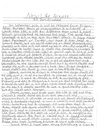
|
2016 mar 11

|
2016 feb 7

|
More... |

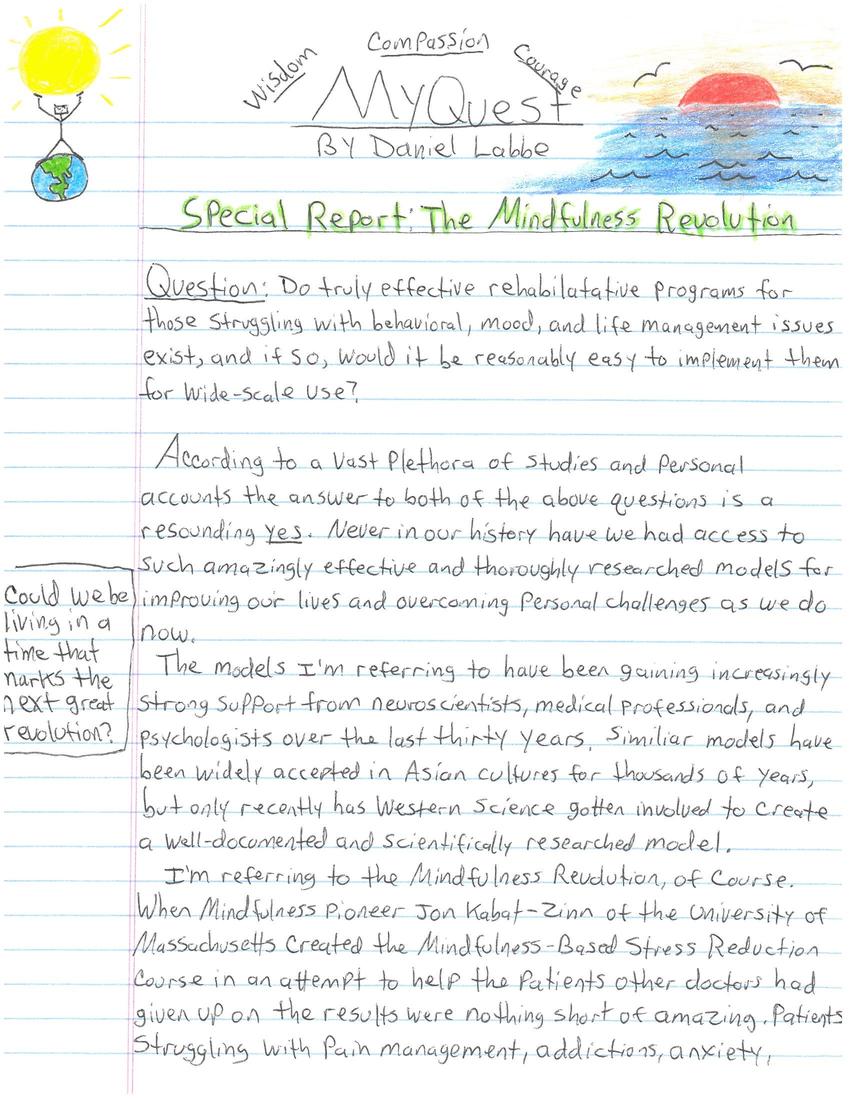
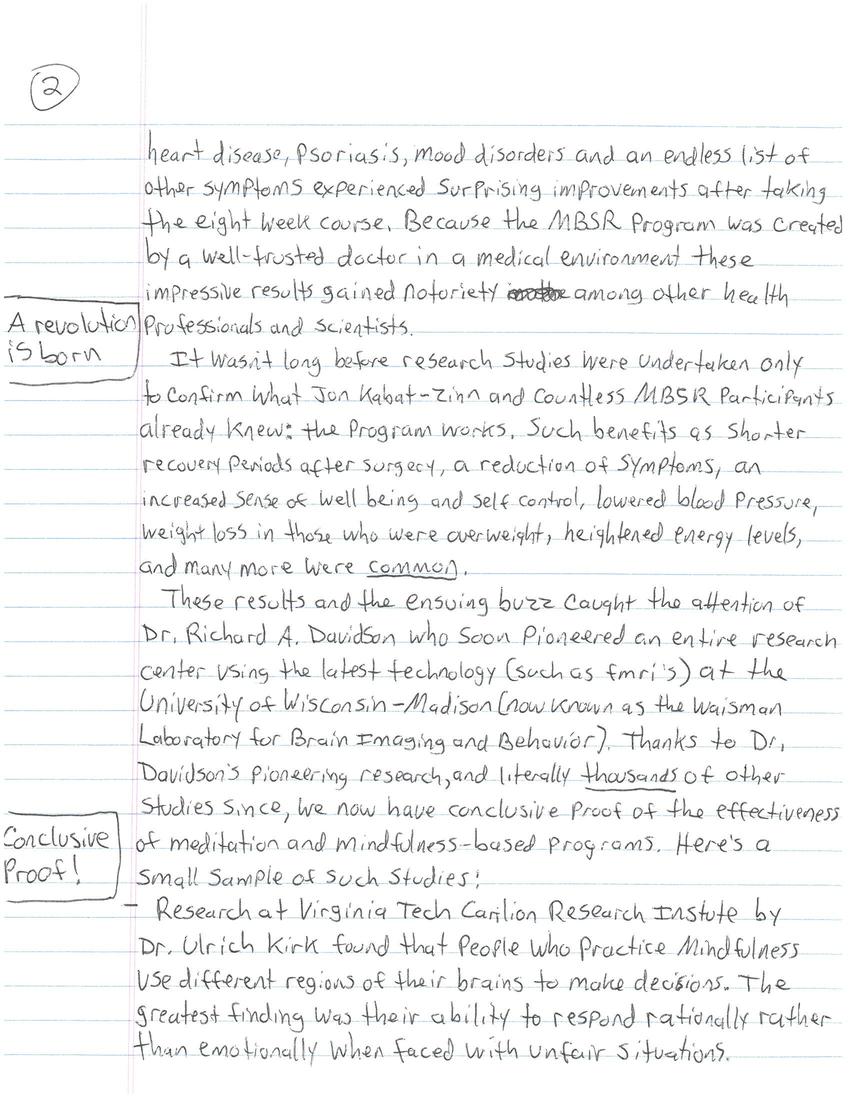
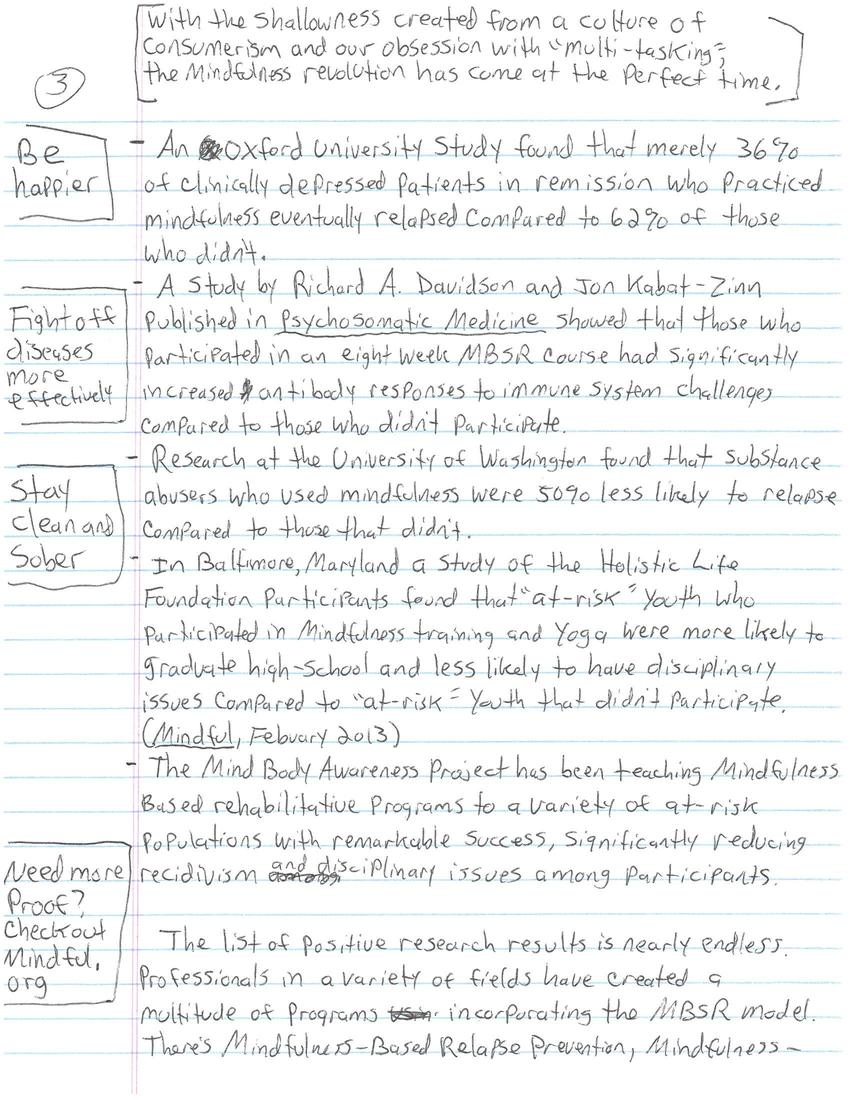
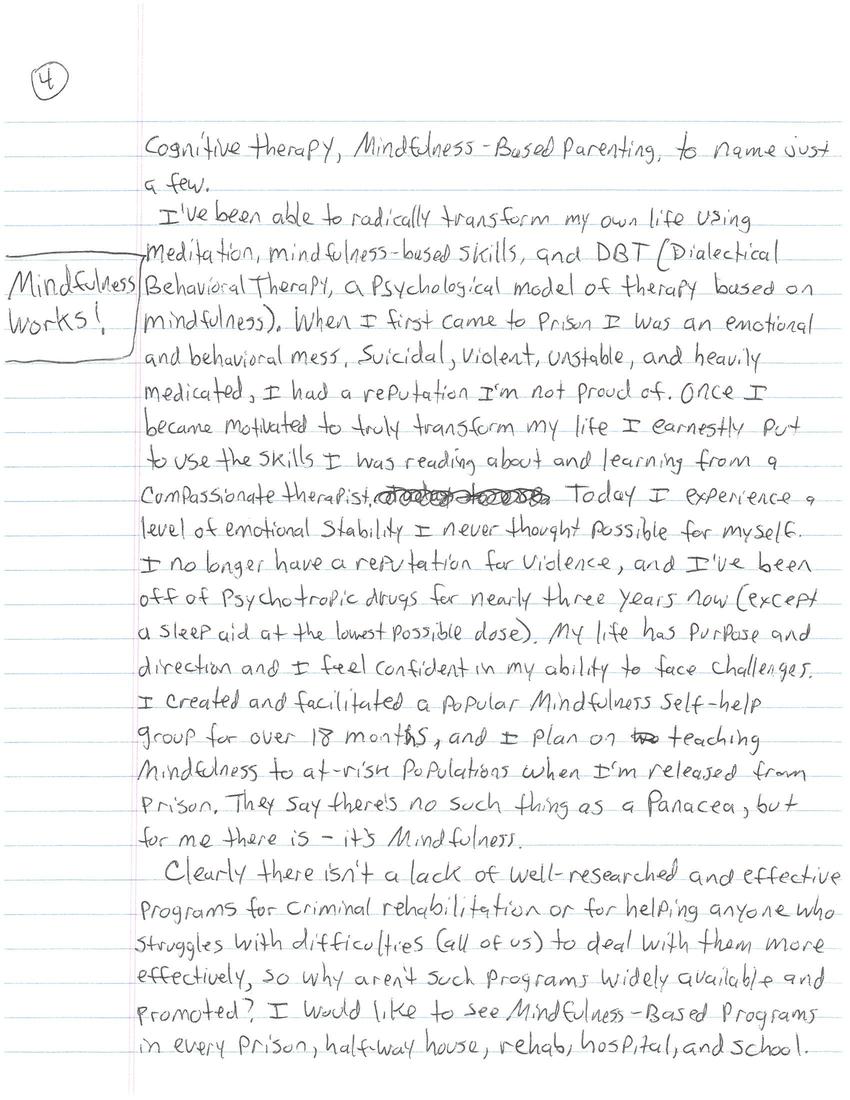
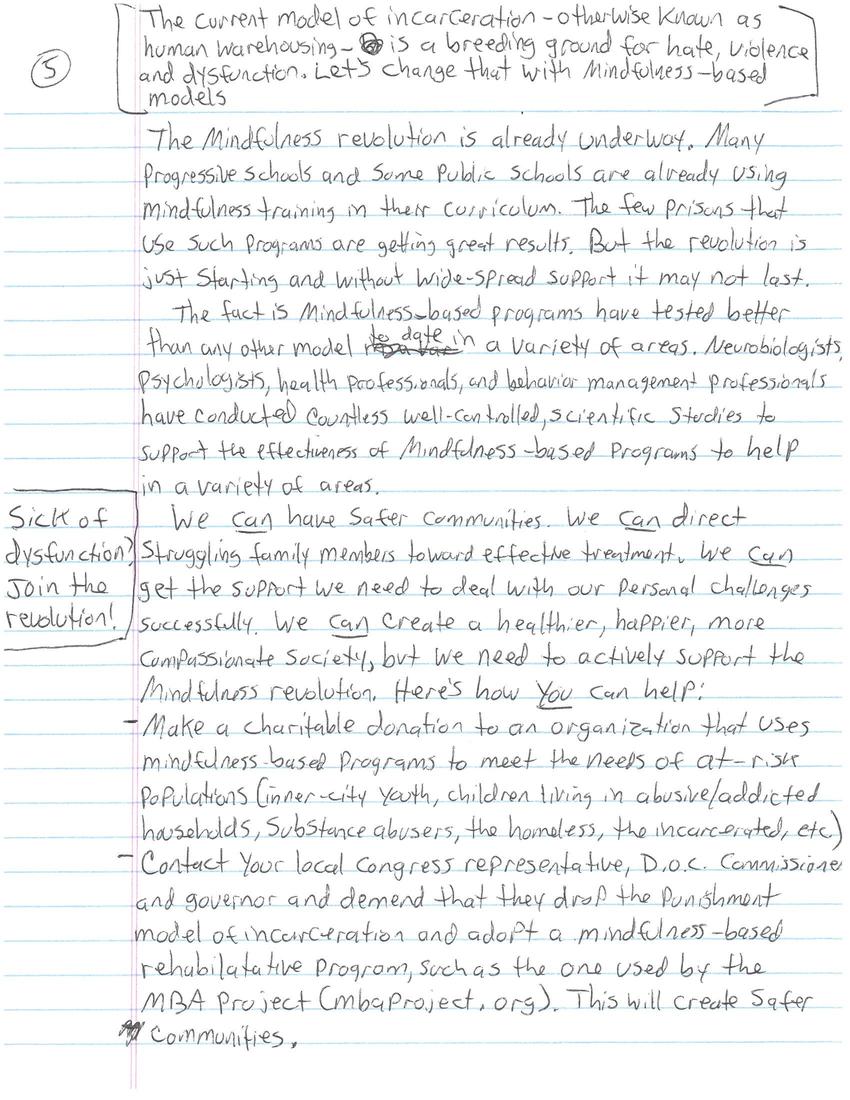
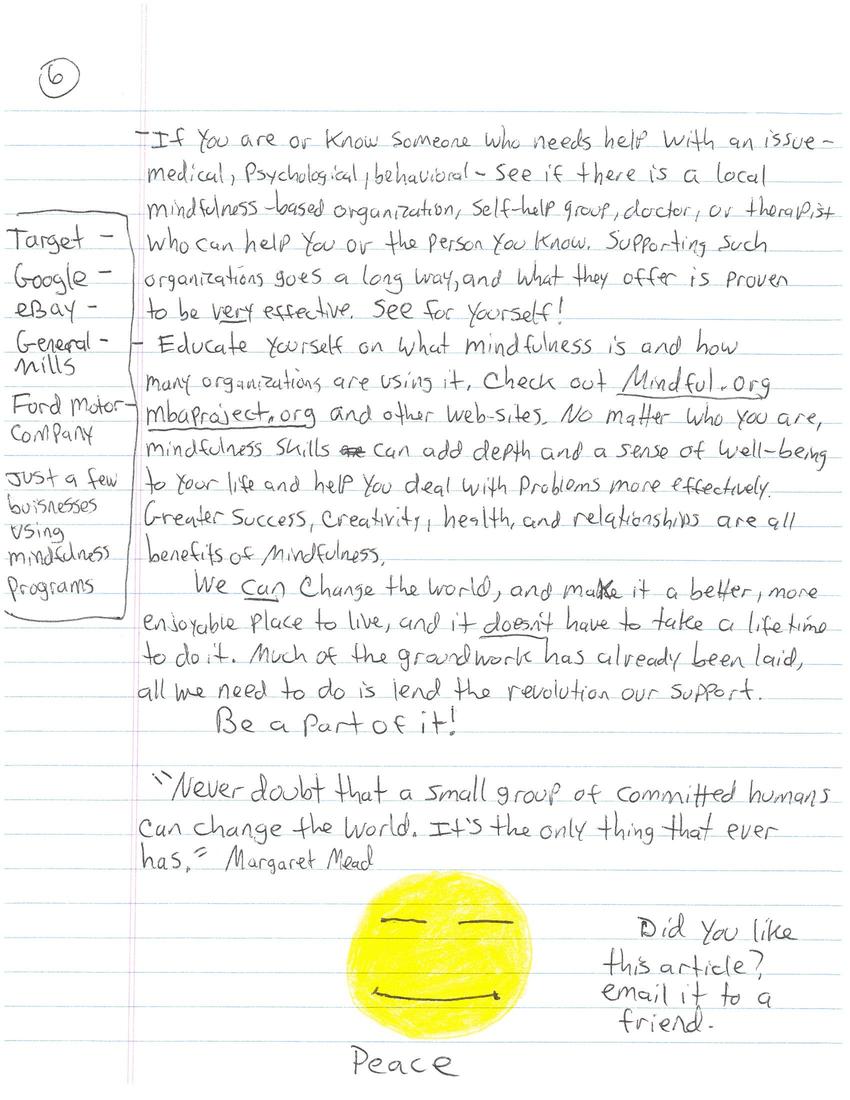

Replies